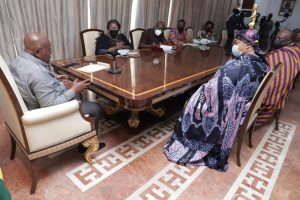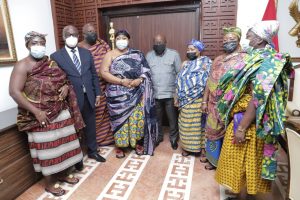President Akufo-Addo has disclosed that, his government will be signing an agreement in Germany on February 16, 2022, towards the production of COVID-19 vaccines locally in Ghana.
He made this known when he was addressing a delegation sent by Asantehene Otumfuo Osei Tutu II to invite him to the 5th anniversary celebration of the enthronement of the queen mother of the Asante Kingdom, Nana Ama Konadu Yiadom III, a ceremony scheduled for 6 and 16 of February 2022.
In his response concerning the invitation, he said he would attend the event on the 6th of February but not on the 16th because he will be in Germany to sign the agreement for the production of vaccines locally in Ghana.
“The 16th date is a problem. I am due to be in Germany for the AU-EU-Brussels Summit. On the same 16th, I will be signing the agreement which forms part of our plans to beginning the local production of vaccines in Ghana,” President Akufo-Addo said to the delegation.

It would be recalled that in his 24th address delivered on Sunday February 28, 2021 to the nation on measures his administration is putting in place to deal with the COVID-19 pandemic, President Akufo-Addo announced the formation of a Vaccine Production Committee.
Additionally, the president outlined his vision of ensuring that Ghana produces COVID-19 vaccines locally.
“I want to reiterate my determination that we should manufacture vaccines here in Ghana.
“To this end, a committee has been established under the chairmanship of the former Minister of Environment, Science, Technology and Innovation, the world-renowned scientist Professor Kwabena Frimpong-Boateng, which is formulating a concrete plan of action towards vaccine development and manufacturing,” the president said at the time.

2023 target year
The presidential vaccine manufacturing committee in Ghana has said it is targeting production of COVID-19 vaccines in Ghana by 2023.
In a media engagement on Friday 27 August 2021, as part of stakeholder consultations towards the production of COVID-19 vaccines in Ghana, Anarfi Asamoah Baah, the coordinator of Ghana’s Coronavirus Response Programme, who is also a member of the committee, had noted that the target was achievable.
Vaccine production plan
Dr. Baah had explained that there were two main challenges that the state was aiming to meet in relation to vaccine production in Ghana.
The first was the ability to produce COVID-19 vaccines already in use in the world and the second was the investment into research and development needed to be able to develop vaccines to counter future pandemics and diseases.
“There are already known vaccines like AstraZeneca, like Pfizer. The testing has been done, the research has been done, the vaccine is in use and we want to be able to copy it in Ghana”.
“In order to do that, you need the government intervention to facilitate discussion between the original owners so that the private sector can be allowed to copy,” Dr Baah had said.
“The second problem we are trying to address is more for the future… How do we develop the capacity to do our own research, discover our own vaccines for future diseases?
“Those are two different situations, and that is what the research institutions need to be supported [to do] on a sustained basis for a number of years,” he had added.









































































